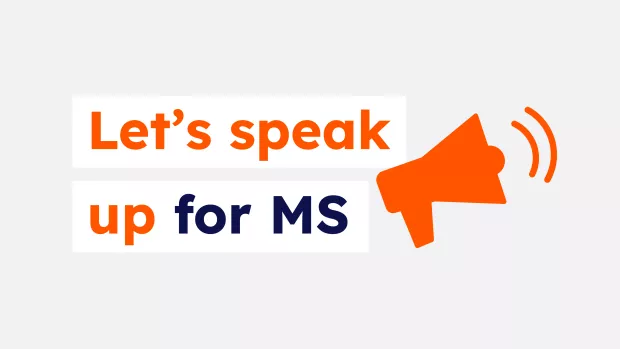
Outnumbered
Craig Watson from Falkirk, Scotland, lives with primary progressive MS, which affects 10-15% of people diagnosed with MS. He’s often felt his type of MS is overlooked but is pleased to see things are starting to improve.
Many people outside of the MS community aren’t aware that MS comes in a variety of flavours, or types. While the majority of people with MS have relapsing remitting MS, I’m one of a small percentage that are diagnosed with primary progressive MS. With primary progressive MS I have no remissions (good spells).
MS is a journey
In the past I’ve likened MS to a train ride. With relapsing remitting MS, the symptoms get on at one station and the conductor throws them off at the next stop. With secondary progressive MS, the conductor eventually gets fed up with throwing the symptoms off the train. With primary progressive MS there's never been a conductor.
The UK population is roughly 67 million. About 130,000 people in the UK have MS, which is 0.2% of the total population. Even if 15% of people with MS have primary progressive MS, that’s still only about 19,500 people. To put this into perspective, if a house stuffed full of people represented the UK population, then all the people with MS could fit in the little downstairs loo. And all the people with primary progressive MS could fit in the sink.
Because of this, it can feel we are often overlooked and a greater focus is placed on the more ‘common’ forms of MS.
It can feel like the road to a cure for people with relapsing remitting MS is a well-maintained motorway, whereas those of us with progressive forms of MS are on the road less travelled, more like a neglected dirt track.
We all hope there’s a cure at the end of the roads, but it feels like people with relapsing MS will get there sooner.
When I was diagnosed in 2015 my then neurologist (he has since retired) said: “You have primary progressive MS, there's nothing we can do for you, goodbye.” I left that consultation feeling probably the lowest I have ever felt. There were no treatments available on the NHS for primary progressive MS at that time. Currently, there is only one treatment for us and that’s only available if your MS is classed as ‘early’ and ‘active’ and you meet certain other criteria. That treatment is a disease modifying therapy (DMT) called Ocrelizumab (brand name Ocrevus), which I'm now on. Of course, this is welcome progress, but there are about 20 different DMTs for people with relapsing MS.
Read about Ocrelizumab (Ocrevus) and who can take it
It feels as though more effort is being spent on improving conditions for people with relapsing MS, rather than on MS and its many flavours. This only adds to the feelings of being forgotten, overlooked and outnumbered.
Things are improving
I applaud the MS Society as they’ve recognised more needs to be done to address progressive forms of MS. They’ve set up co-production teams to increase visibility – I’m a member of two. Co-production is when people who live with MS, like me, work equally with staff from the MS Society on projects that will benefit us.
The MS Society is also funding the Octopus trial, which is looking at existing medications that could also be used to treat progressive MS. And they’re part-funding ChariotMS, which is trialling a potential treatment for people with advanced progressive MS, who have limited mobility in their legs but still have some use of their arms and hands.
Of course we’re hoping one of these trials will also lead to the Holy Grail: a cure for MS.
Read Craig’s blog about the pros and pros of co-production
I hope that through the work of the MS Society more people become aware of the different types of MS. People don’t need to understand these types (no one really does) but knowing of their existence would be fantastic. As someone with primary progressive MS, I would still be outnumbered but would feel more understood and believe that I was not being overlooked or forgotten about as much as I do now.



